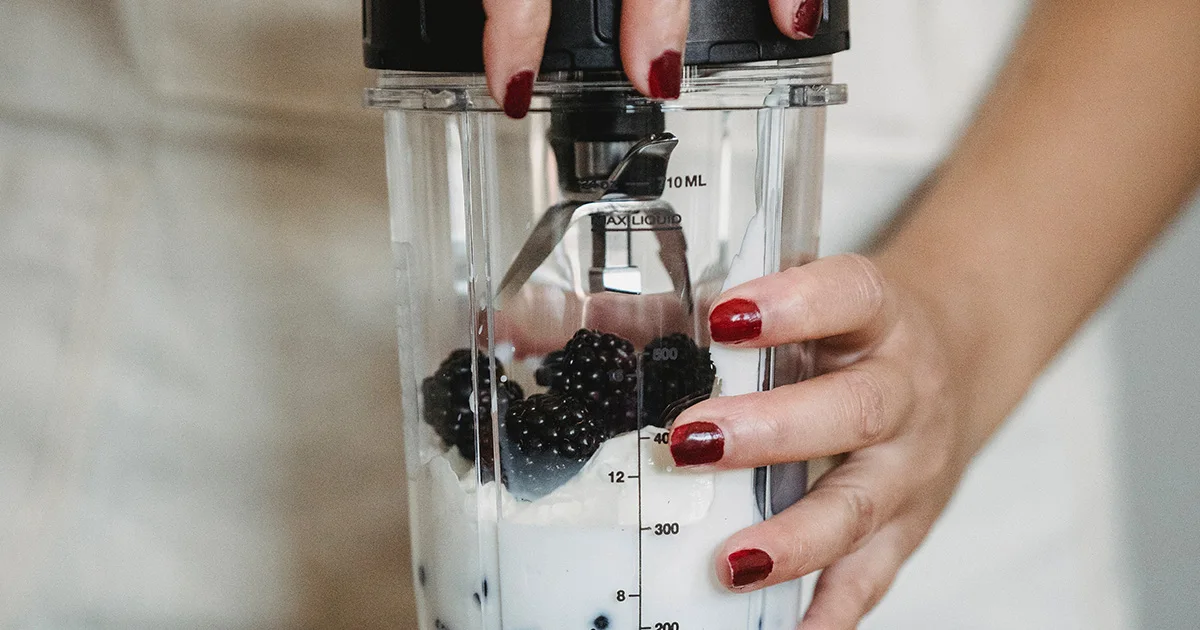Key takeaways
Oatzempic is a blended drink of oats, lime juice, and water that is trending on social media due to its supposed weight loss effects.
People on social media claim the oat drink can help you lose 40 pounds in two months.
While oatzempic is low in calories and contains some fiber, it’s unlikely to cause weight loss results comparable to medications, such as Ozempic.
Here's what we'll cover
Here's what we'll cover
Key takeaways
Oatzempic is a blended drink of oats, lime juice, and water that is trending on social media due to its supposed weight loss effects.
People on social media claim the oat drink can help you lose 40 pounds in two months.
While oatzempic is low in calories and contains some fiber, it’s unlikely to cause weight loss results comparable to medications, such as Ozempic.
You’ve likely heard of Ozempic, the diabetes medication commonly prescribed off-label for weight loss. And you’ve likely heard of, or even enjoyed a bowl of, oatmeal. Now, there’s—drum roll, please—oatzempic.
This portmanteau refers to a blended beverage of oats, water, and lime juice that supposedly can lead to dramatic weight loss à la Ozempic. That is, at least, according to people on social media, many of whom claim oatzempic (which is not affiliated with the medication) can help you lose up to 40 pounds in two months. But, as with everything you see and read on the internet, you have to wonder: is this legitimate?
Ahead, we take a closer look at oatzempic and explore what science says, if anything, about sipping on this oat drink for weight loss.
Ozempic Important Safety Information: Read more about serious warnings and safety info.
You’ve likely heard of Ozempic, the diabetes medication commonly prescribed off-label for weight loss. And you’ve likely heard of, or even enjoyed a bowl of, oatmeal. Now, there’s—drum roll, please—oatzempic.
This portmanteau refers to a blended beverage of oats, water, and lime juice that supposedly can lead to dramatic weight loss à la Ozempic. That is, at least, according to people on social media, many of whom claim oatzempic (which is not affiliated with the medication) can help you lose up to 40 pounds in two months. But, as with everything you see and read on the internet, you have to wonder: is this legitimate?
Ahead, we take a closer look at oatzempic and explore what science says, if anything, about sipping on this oat drink for weight loss.
What is oatzempic?
Oatzempic is a citrusy oatmeal smoothie that got its start on TikTok.
Though its (undeniably catchy) name is a combination of “oats” and “Ozempic,” the beverage does not contain the prescription drug. Rather, it’s made of just three ingredients: oats, water, and lime juice. While the exact measurements of these items seem to vary slightly across accounts on social media, many people follow this recipe: Add 1/2 cup of oats, 1 cup of water, and juice of half of a lime into a blender and blend until smooth.
As mentioned above, proponents of the oaty beverage claim that drinking it daily can help you lose weight. Some individuals have even equated the weight loss results to those from Ozempic, which research has been found to produce profound weight loss in some people. For example, in one study, participants lost an average of 13–15 pounds in the first 10 months of taking semaglutide (the active ingredient in Ozempic).
As for the oatzempic drink and its purported slim-down skills? Let’s get into it…
Can oatzempic help with weight loss?
Although there’s no one size fits all formula for weight loss, there is one universal, crucial component for shedding pounds: a calorie deficit.
In other words, to lose weight, you need to consume fewer calories than you burn. So, if you’re using oatzempic as a meal replacement for a heavier-calorie, less healthful breakfast, the beverage could theoretically help with weight loss. “Anything that is low in calories can help with weight loss, [but] that doesn’t mean you should try it,” says Lauren Harris-Pincus, MS, RDN, Ro advisor and cookbook author.
“One serving of oatzempic contains approximately 150 calories, which is about half of what I recommend for breakfast for someone trying to lose weight,” Harris-Pincus adds, explaining that 25-30 grams of protein for breakfast is ideal for weight loss as it helps to balance blood sugar, sustain energy levels, and curb snacking later in the day.
Oatzempic, however, only contains a few grams of protein and fiber, is mostly carbohydrates, and lacks fruits or vegetables. (We’re not counting lime juice as a fruit serving.) “There is no nutritional balance and will likely cause you to feel hungry again quickly,” Harris-Pincus says.
Half a cup of raw oats offers about 4 grams of fiber and 5 grams of protein, according to the US Department of Agriculture. And while these amounts are still not enough for a healthy breakfast, they may help explain why people claim oatzempic can help with weight loss. Both fiber and protein can promote satiety, leading you to stop eating sooner, feel fuller longer, and, in turn, consume fewer calories throughout the day. What’s more, oats are especially high in beta-glucan, a type of soluble fiber that can be effective at increasing satiety, lowering appetite, and preventing weight gain. But, again, oatzempic contains fairly modest amounts of fiber and protein. So, it's unlikely that the oaty concoction provides the full range of weight loss benefits typically associated with these nutrients.
Plus, there isn’t any research on oatzempic overall or its supposed weight loss potential. There are, however, findings that suggest most TikTok health trends are not based on science.“MyFitnessPal recently partnered with Dublin City University on a research project that examined diet and nutrition content on TikTok,” Harris-Pincus says. “After analyzing 67,000 TikTok videos and comparing them to public health and nutrition guidelines, only 2.1% are considered accurate. That's a big red flag for those who count on TikTok and other social media content for nutrition information.”
Is oatzempic safe?
“Though I would not recommend it as a wise choice for weight loss, there is nothing unsafe about trying oatzempic,” Harris-Pincus says. “Oats are lovely, and they have a place in a healthy diet paired with protein from milk, soymilk, Greek yogurt, or protein powder and topped with fruit and a few nuts. By itself, you are missing out on important nutrients.”
Although fairly uncommon, an allergy to oats or limes—and, thus, oatzempic—is possible. Those with allergies to other grains (e.g. wheat) or atopic conditions (e.g. eczema, asthma) may be more prone to cross-reactivity with oats. And given its fiber content, oatzempic may also cause gastrointestinal issues (think: bloating, gas, constipation) in people unaccustomed to eating a high-fiber diet as well as those with a sensitive stomach or GI condition. Point being: It’s always a good idea to talk to your healthcare provider before trying anything new, no matter your medical history.
The main concern around this TikTok trend is if it gets taken too far. Extreme weight loss diets are rarely safe or sustainable. And if you’re relying on a mere 150-calorie beverage to get you through the day, let alone through breakfast, you could lose too much weight, too quickly. The kind of rapid weight loss some people are claiming to enjoy with oatzempic is not safe nor realistic. A slow-and-steady approach (around 1–2 pounds per week) is much more doable, safer, and successful, when it comes to weight loss.
Alternatives to oatzempic for weight loss
As appealing—or unappealing—as oatzempic may sound, there is no quick fix for weight loss. Sustainable weight loss happens when you commit to healthy lifestyle habits. Here are six ways you can healthify your life for better weight loss results.
Reduce your caloric intake
How much you eat can play a major role in how much weight you lose (or gain). The typical recommendation for people with obesity or overweight looking to shed pounds is to consume 500–750 fewer calories per day. Doing so can help you achieve a calorie deficit, which prompts the body to use stored fat for energy and can ultimately lead to weight loss. Being mindful of portion sizes can help you meet your daily caloric goals.
Follow a balanced diet and drink plenty of water
Speaking of what to eat, improving your diet can help you lose weight and keep it off. To best support your slim-down goals, make sure to pack your plate with plenty of protein and fiber—both of which, as mentioned above, can promote satiety and help regulate blood sugar levels, leading to weight loss. Plus, protein prevents the loss of lean muscle mass, which you need to keep your metabolism working optimally.
And don’t forget to stay hydrated! While more research is needed, some studies suggest that drinking more water can help lead to a modest amount of weight and fat loss. In particular, studies have found a correlation between weight loss and:
Replacing higher-calorie beverages with water
Drinking water before eating a meal
Drinking more water in general
Exercise regularly
Exercise also helps with weight loss, in part by regulating your appetite. When starting a workout routine for weight loss, the key is to find a routine that you enjoy, whether that’s walking, hiking, weight lifting, yoga, or swimming. The more you enjoy it, the easier it will be to stick with it. If your goal is to maximize weight loss, however, a combination of resistance training and aerobic exercise seems to be most effective, according to research.
Get more sleep
If you’re regularly getting fewer than 7–9 hours of sleep per night, now’s the time to change that. Poor shut-eye—whether sleeping too little, too much, or too restlessly—can impede your weight loss efforts. Multiple studies of people in weight loss programs have found that those who sleep better tend to have an easier time sticking to their diet and exercise routine and lose more weight and body fat as a result.
Consider weight loss medications
If you’ve already tried lifestyle changes and you’re still struggling to lose weight, you might want to consider weight loss medications. When combined with a balanced diet and regular exercise, GLP-1 medications—e.g. Wegovy (semaglutide), Zepbound (tirzepatide)—can help reduce appetite and promote weight loss. In clinical trials of Wegovy, for example, participants lost around 16% of their body weight after about 16 months of treatment combined with diet and exercise.
To learn more and potentially receive a prescription, consult a healthcare provider. You can do this in person or virtually, such as through Ro, which offers access to weight loss medications and provides personalized support to help you achieve your weight loss goals safely and effectively.
Wegovy Important Safety Information: Read more about serious warnings and safety info.
Zepbound Important Safety Information: Read more about serious warnings and safety info.
DISCLAIMER
If you have any medical questions or concerns, please talk to your healthcare provider. The articles on Health Guide are underpinned by peer-reviewed research and information drawn from medical societies and governmental agencies. However, they are not a substitute for professional medical advice, diagnosis, or treatment.
Bracamontes-Castelo, G., Bacardí-Gascón, M., & Jiménez Cruz, A. (2019). Effect of water consumption on weight loss: a systematic review. Nutricion Hospitalaria, 36(6), 1424–1429. doi: 10.20960/nh.02746. Retrieved from https://pubmed.ncbi.nlm.nih.gov/31657610/
Cox, C. E. (2017). Role of Physical Activity for Weight Loss and Weight Maintenance. Diabetes Spectrum: A Publication of the American Diabetes Association, 30(3), 157–160. doi: 10.2337/ds17-0013. Retrieved from https://www.ncbi.nlm.nih.gov/pmc/articles/PMC5556592/
Creasy, S. A., Ostendorf, D. M., Blankenship, J. M., et al. (2022). Effect of sleep on weight loss and adherence to diet and physical activity recommendations during an 18-month behavioral weight loss intervention. International Journal of Obesity (2005), 46(8), 1510–1517. doi: 10.1038/s41366-022-01141-z. Retrieved from https://www.ncbi.nlm.nih.gov/pmc/articles/PMC9850430/
Dorling, J., Broom, D. R., Burns, S. F., et al. (2018). Acute and Chronic Effects of Exercise on Appetite, Energy Intake, and Appetite-Related Hormones: The Modulating Effect of Adiposity, Sex, and Habitual Physical Activity. Nutrients, 10(9), 1140. doi: 10.3390/nu10091140. Retrieved from https://www.ncbi.nlm.nih.gov/pmc/articles/PMC6164815/
Francis, O. L., Wang, K. Y., Kim, E. H., & Moran, T. P. (2020). Common food allergens and cross-reactivity. Journal of Food Allergy, 2(1), 17–21. doi: 10.2500/jfa.2020.2.200020. Retrieved from https://www.ncbi.nlm.nih.gov/pmc/articles/PMC11250430/
Frías, J. P., Auerbach, P., Bajaj, H. S., et al. (2021). Efficacy and safety of once-weekly semaglutide 2·0 mg versus 1·0 mg in patients with type 2 diabetes (SUSTAIN FORTE): a double-blind, randomised, phase 3B trial. The Lancet. Diabetes & Endocrinology, 9(9), 563–574. doi: 10.1016/S2213-8587(21)00174-1. Retrieved from https://pubmed.ncbi.nlm.nih.gov/34293304/
Howard, E. J., Meyer, R. K., Weninger, S. N., et al. (2024). Impact of Plant-Based Dietary Fibers on Metabolic Homeostasis in High-Fat Diet Mice via Alterations in the Gut Microbiota and Metabolites. The Journal of Nutrition, 154(7), 2014–2028. doi: 10.1016/j.tjnut.2024.05.003. Retrieved from https://www.ncbi.nlm.nih.gov/pmc/articles/PMC11282473/
Joshi, S. & Mohan, V. (2018). Pros & cons of some popular extreme weight-loss diets. The Indian Journal of Medical Research, 148(5), 642–647. doi: 10.4103/ijmr.IJMR_1793_18. Retrieved from https://www.ncbi.nlm.nih.gov/pmc/articles/PMC6366252/
Kim, J. Y. (2021). Optimal Diet Strategies for Weight Loss and Weight Loss Maintenance. Journal of Obesity & Metabolic Syndrome, 30(1), 20–31. doi: 10.7570/jomes20065. Retrieved from https://www.ncbi.nlm.nih.gov/pmc/articles/PMC8017325/
Kline, C. E., Chasens, E. R., Bizhanova, Z., et al. (2021). The association between sleep health and weight change during a 12-month behavioral weight loss intervention. International Journal of Obesity (2005), 45(3), 639–649. doi: 10.1038/s41366-020-00728-8. Retrieved from https://www.ncbi.nlm.nih.gov/pmc/articles/PMC7914147/
Koliaki, C., Spinos, T., Spinou, Μ., et al. (2018). Defining the Optimal Dietary Approach for Safe, Effective and Sustainable Weight Loss in Overweight and Obese Adults. Healthcare (Basel, Switzerland), 6(3), 73. doi: 10.3390/healthcare6030073. Retrieved from https://www.ncbi.nlm.nih.gov/pmc/articles/PMC6163457/
Phelan, S., Halfman, T., Pinto, A. M., et al. (2020). Behavioral and Psychological Strategies of Long-Term Weight Loss Maintainers in a Widely Available Weight Management Program. Obesity (Silver Spring, Md.), 28(2), 421–428. doi: 10.1002/oby.22685. Retrieved from https://www.ncbi.nlm.nih.gov/pmc/articles/PMC7003766/
PR Newswire. (2023, September 6). Concerning new statistics highlight inaccurate nutrition trends on TikTok. PR Newswire. Retrieved from https://www.prnewswire.com/news-releases/concerning-new-statistics-highlight-inaccurate-nutrition-trends-on-tiktok-302114407.html
Rubino, D. M., Greenway, F. L., Khalid, U., et al. (2022). Effect of Weekly Subcutaneous Semaglutide vs Daily Liraglutide on Body Weight in Adults With Overweight or Obesity Without Diabetes: The STEP 8 Randomized Clinical Trial. JAMA, 327(2), 138–150. doi: 10.1001/jama.2021.23619. Retrieved from https://pubmed.ncbi.nlm.nih.gov/35015037/
Thornton, S. N. (2016). Increased Hydration Can Be Associated with Weight Loss. Frontiers in Nutrition, 3, 18. doi: 10.3389/fnut.2016.00018. Retrieved from https://www.ncbi.nlm.nih.gov/pmc/articles/PMC4901052/
US Department of Agriculture (USDA). (2020). FoodData Central: Oats, raw. Retrieved from https://fdc.nal.usda.gov/fdc-app.html#/food-details/1101825/nutrients
Zaremba, S. M. M., Gow, I. F., Drummond, S., et al. (2018). Effects of oat β-glucan consumption at breakfast on ad libitum eating, appetite, glycemia, insulinemia and GLP-1 concentrations in healthy subjects. Appetite, 128, 197–204. doi: 10.1016/j.appet.2018.06.019. Retrieved from https://pubmed.ncbi.nlm.nih.gov/29920323/













